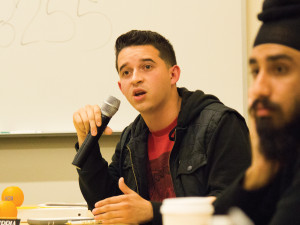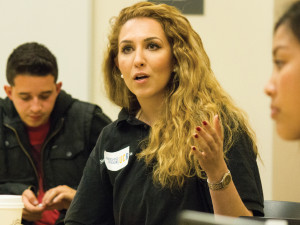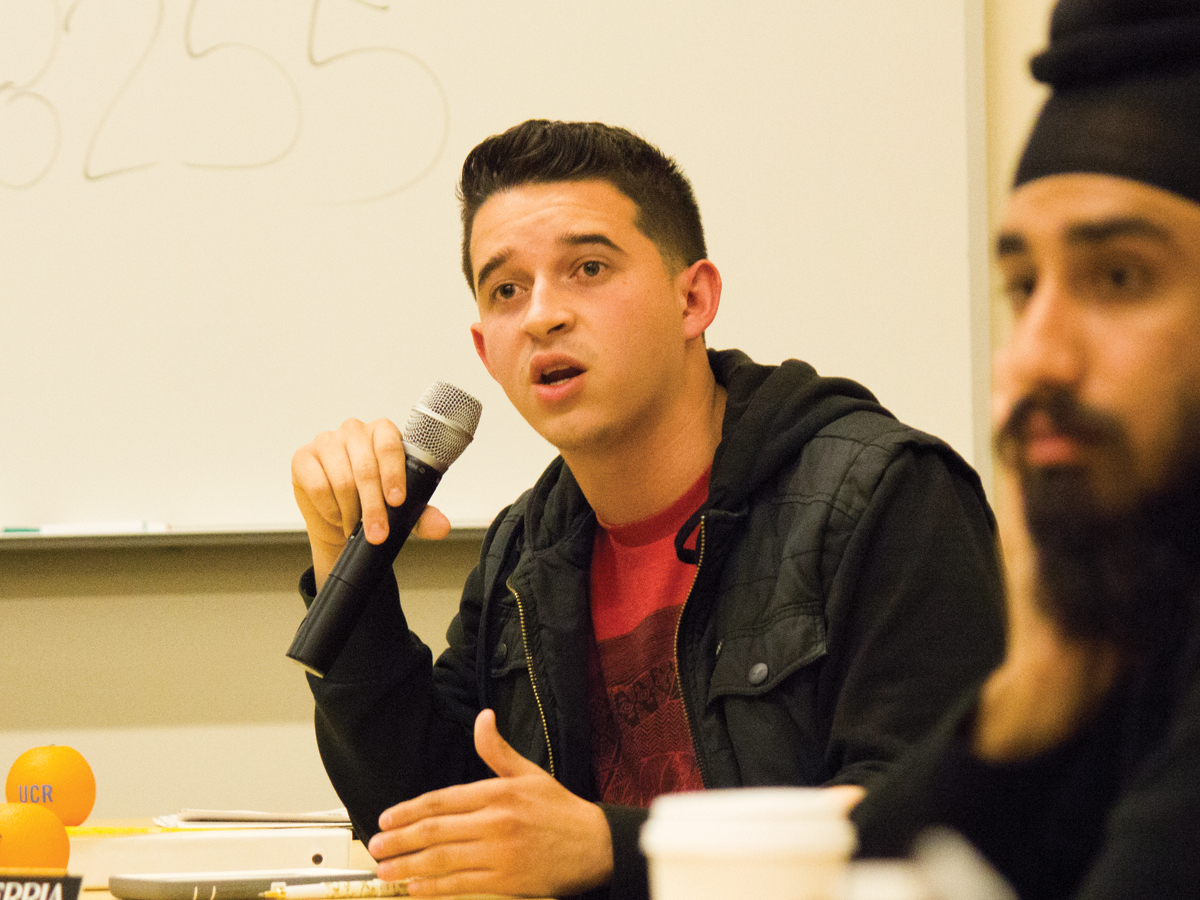Last Wednesday’s more than six-hour-long ASUCR senate meeting was rife with controversy as spectators overflowing from the room expressed both support for and opposition to recent actions taken by ASUCR, including the initial disqualification of all [OUR]Voice candidates from the election, which was repealed last Friday.

The meeting, held in the Student Services Building, was attended by over 100 students, with many chanting, “Where is the truth, the senate needs the boot!” and “Not your selection, this is our election!” 10 minutes into the meeting, halting its progress. Executive Vice President and recently elected Vice President of Internal Affairs Michael Ervin deemed the meeting out of order and called for adjournment; however, the senate only went into recess.
“I feel like they don’t want anybody to be heard … the [OUR]Voice people are being very immature and aggressive and it’s sad to see that,” said fourth-year anthropology major Sarah Cavazos about the disruption.
Newly elected [OUR]Voice senator Wen-Yu Chou, however, disagreed. “The chanting has to be heard. They took our voice away,” she commented during the recess.
ASUCR President Nafi Karim, Parliamentarian Mohamed Hussein and Ervin did not rejoin the session when ASUCR reconvened roughly an hour later, deeming the session unconstitutional.
President Pro Tempore Devin Plazo chaired the session, warning the crowd that students who continued disrupting would be reported to student conduct. Public comment recommenced, with members of the galley bringing forth concerns in regards to [OUR]Voice’s disqualification.
“Where is the concrete, 100 percent fact that you’ve seen us laptop? … We all deny that video … we need the facts to confirm everything, and that’s what I’m asking for,” said [OUR]Voice candidate Kevin Chau, referring to a video that allegedly shows [OUR]Voice volunteers laptopping — carrying a mobile device and persuading students to vote for candidates on that device — in a residence hall.
Members of [OUR]Voice have stated that the video is illegitimate because the faces of the laptoppers are not visible. Others contend that the video proves the party violated two sections of the elections code, which bans laptopping as well as campaigning in residence halls.
Each [OUR]Voice candidate initially received four or more strikes for charges varying from passing out promotional items without permission to illegally campaigning near polling sites and within on-campus housing. According to the elections code, three strikes result in disqualification from the elections.
Ervin as well as current personnel director and recently elected president Ashley Harano, both members of [OUR]Voice, each received a total of five violations. One strike was granted due to their prior association with [YOUR]Side, which was found guilty of carrying out discriminatory practices.
Vice President of External Affairs Abraham Galvan responded to Chau’s allegations that the decision to assign strikes based on the video was unfair. “We don’t need 100 percent proof to know that something is going on and to address an issue. There’s levels of evidence that are required for different things and when the committee that is specifically tasked to review those cases finds that there is enough evidence … that’s when decisions are made,” he said.
Following public forum, ASUCR moved into a closed session to vote on whether to censure Karim and Ervin. Approximately 10 members of the galley occupied the elevator to prevent the closed session from taking place, only leaving after a campus administrator called UCPD when they did not comply with his requests for them to leave.
Karim and Ervin Censured, ECAB Overhaul

The senate reconvened in open session after roughly two hours, during which they voted 10-0-1 to censure Karim, and 10-0-2 to censure Ervin. A censured individual retains his or her title, but is not paid and is barred from performing the duties of their position.
Among the charges levied against Karim were: failure to serve as an ASUCR student representative on the city task force committee, failure to serve as chair of the ASUCR officers cabinet, failure to chair all executive cabinet meetings and failure to attend senate meetings, in addition to several other charges.
Charges levied against Ervin were, among other things, failure to be well-versed in parliamentary procedure, failure to organize and conduct swearing-in ceremonies for all newly elected ASUCR officials and failure to hold one-on-one meetings with each senator once per quarter to discuss goals and performance.
Vice President of Internal Affairs Fernando Echeverria was named acting president by a unanimous vote, and Senator Reem Blaik was named acting executive vice president by a vote of 6-2-1. Former ASUCR senator Ranjit Nair was chosen by an 8-2-1 vote as acting vice president of internal affairs.
“Setting up this precedent of justice and integrity in ASUCR is going to be remembered for years … this is great and you’ve really brought integrity back to the office,” said second-year political science major and [YOU]CR candidate Eddie Franco about the decision to censure the two.
As of press time, Neither Ervin nor Karim have responded to requests for comment.
[OUR]Voice disqualification repealed
After a number of judicial appeals, the remaining three justices repealed violations against [OUR]Voice last Friday shortly before elections results became public because the legitimacy of the charges levied against the party could not be verified, according to a statement released by the judicial branch. The party swept the elections, winning every executive cabinet position and 13 out of 16 seats in the senate, with PAC and [YOU]CR winning the remaining three.
Although the branch still does not meet quorum, an agreement was made during a closed meeting on Monday between ASUCR and members of administration to allow the three remaining justices to handle appeals. After the elections, the senate will be looking for justices to fill remaining spots so that the branch can reach quorum and commence handling cases once again.
“It is in our opinion that there is no current objective method to validate claims of laptopping,” reads the statement. “It is illogical to try and prove or substantiate grounds of objectivity in an area that is almost completely subjective.”
The results remained controversial, as one of the three justices left the May 8 meeting for more than two hours, calling into question the legitimacy of the ruling. The judicial branch maintains that the ruling was still unanimous, and that the final decision was made while all three justices were present.
Elections Director Stephanie Rose, as of press time, has not commented on whether this issue will be brought forward at the next meeting.
Contributions made by Colin Markovich
Video Coverage of ASUCR meetings are available at www.youtube.com/UCRChannelH








